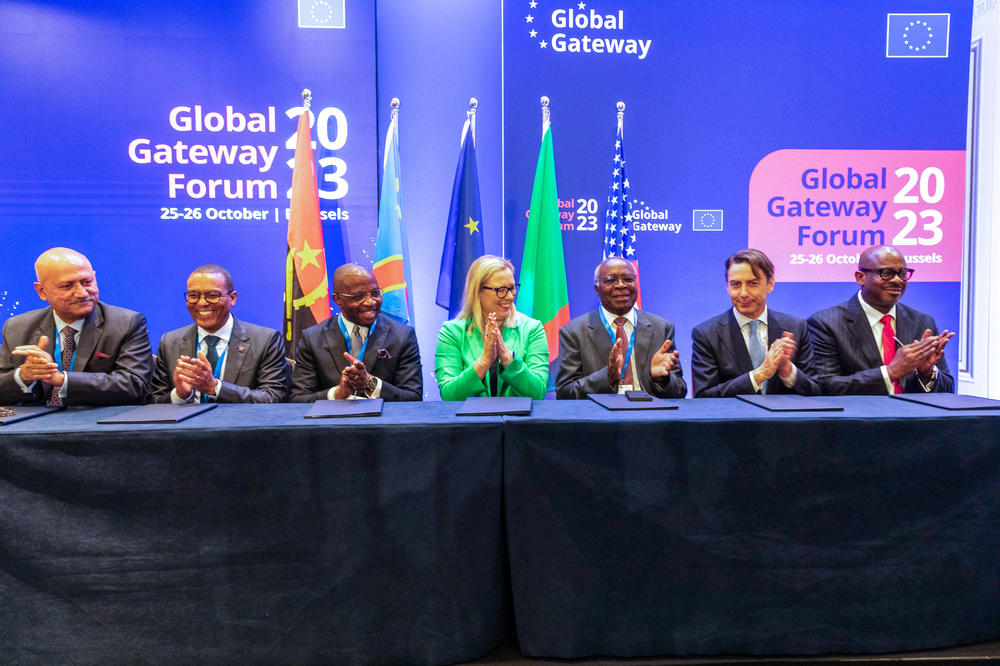Global Gateway: An Alternative to the Belt and Road Initiative?
SCRIPTS Blog Post No. 68 by Lunting Wu
№ 68/2023 from Oct 30, 2023
The Global Gateway Forum (GGF) took place in Brussels a week after the 3rd Belt and Road Forum (BRF) in Beijing. Launched almost two years ago, the Global Gateway (GG) is based on six principles: democratic values and high standards, good governance and transparency, equal partnerships, green and clean, security focused, and catalysing private sector investment. It is the EU’s biggest global investment programme to date with EUR 300 billion (until 2027) aiming to fund projects in six sectors: climate and energy, digital sector, transport, health, and education and research.
According to the European Commission, in 2023, nearly 2/3 of the GG global flagship projects are climate- or energy-focused and around 1/5 are transport-related. Regionally speaking, Africa and Latin America appear to receive more projects than Asia and the Western Balkans/EU Neighbourhood. This is also partly reflected by the predominance of high-ranking African leaders in the GGF. In this light, it is in Africa and LAC that the GG may be in a stronger position to interact, co-exist with, or even contest the Belt and Road Initiative (BRI). But apart from the apparent competing narratives, does the GG provide an alternative to the BRI?
Indeed, the GG seeks to address existing existing problems that come with foreign investment in developing countries, especially with regards to environment, labour, and sovereignty. It also aspires to rely on private sector in operationalising the project and mobilising funds. This stands in contrast with the BRI which is mainly carried out by Chinese SOEs, policy banks, state-owned commercial banks, sovereignty funds, and other party-state agencies. To lessen intrusiveness and increase attractiveness to partner countries, there are voices within the EU that call for reducing political conditionality in the GG while promoting technical requirements and maintaining some socio-economic conditionality (on issues like environment or labour, for instance). Hence, the liberal conditionality that Brussels traditionally attaches to foreign aid, (e.g. democracy, human rights, or rule of law) does not feature prominently in the GG. These differences notwithstanding, the GG not only comes "too little, too late" for some but also shares striking similarities with the BRI. First, compared with the EUR 300 billion euros Brussels seeks to mobilize for the GG by 2027, the BRI has reportedly issued loans worth USD 400 billion between 2014 and 2018. Contracts signed in 2022 alone were worth about USD 100 billion euros. The GG is far away from matching the funding provided by the BRI.
Second, both the GG and the BRI (partly) aim for de-risking, and both practice mercantilism to secure critical raw materials and energy. These practices include influecing key suppliers, diversifying products, suppliers, and transit routes, and protecting vulnerable assets. The difference is that Brussels admits to de-risking while Beijing does not. Still, de-risking speaks more to the EU’s own interests than to those of the partner countries, in the similar way that the BRI corresponds more to China’s own strategic interests than to those of others. For instance, currently, Brussels is building—within the joint framework of the GG and the Partnership for Global Infrastructure and Investment (PGII)—the Trans-African Corridor connecting southern Democratic Republic of Congo and northern Zambia with a port in Angola. The GG's investments in infrastructure linking energy/resources sites and transportation hubs will likely invite criticisms from developing countries for only enriching the donors and for not benefitting the local society. The uneven distribution of investment benefits has earned BRI allegations of neo-colonialism. Third, similar to the BRI, the GG may serve strategic goals rather than developmental ones. This may explain why some countries like Brazil refuse to endorse the GG—the same way they have refused to endorse the BRI. Brazilian officials view GG products in the country not being jointly built with the Brazilian government, which raises the question of local ownership and accountability. Fourth, the GG and the BRI are both "old wine in new bottles”. Several initiatives preceded the GG, e.g. the EU Strategy on Connecting Europe and Asia, or the Economic and Investment Plan for the Western Balkans. Brussels rebranded those initiatives and subsumed them under the GG. This raises the question regarding the extent to which the GG—like the BRI—is a novelty at all.
Rather than countervailing the BRI, Brussels might use the GG to do a better job—the same way as Beijing should do and has done—pondering the actual needs of the oft-weaker partner countries. After all, contestations of all sorts—including those from the GG—have pushed the BRI towards a seemingly more sustainable and inclusive direction and have led Beijing to create the Global Development Initiative (GDI). It remains to be seen how the GG will unfold amidst contestations from partner countries, alternative donors (like China), and civil society organizations, which have been marginalized so far.
Dr. Lunting Wu is Researcher at the Centre for East European and International Studies (ZOiS), Associate at the SCRIPTS Cluster of Excellence, and Fellow of FGV Europe and Instituto do Oriente of the University of Lisbon.

